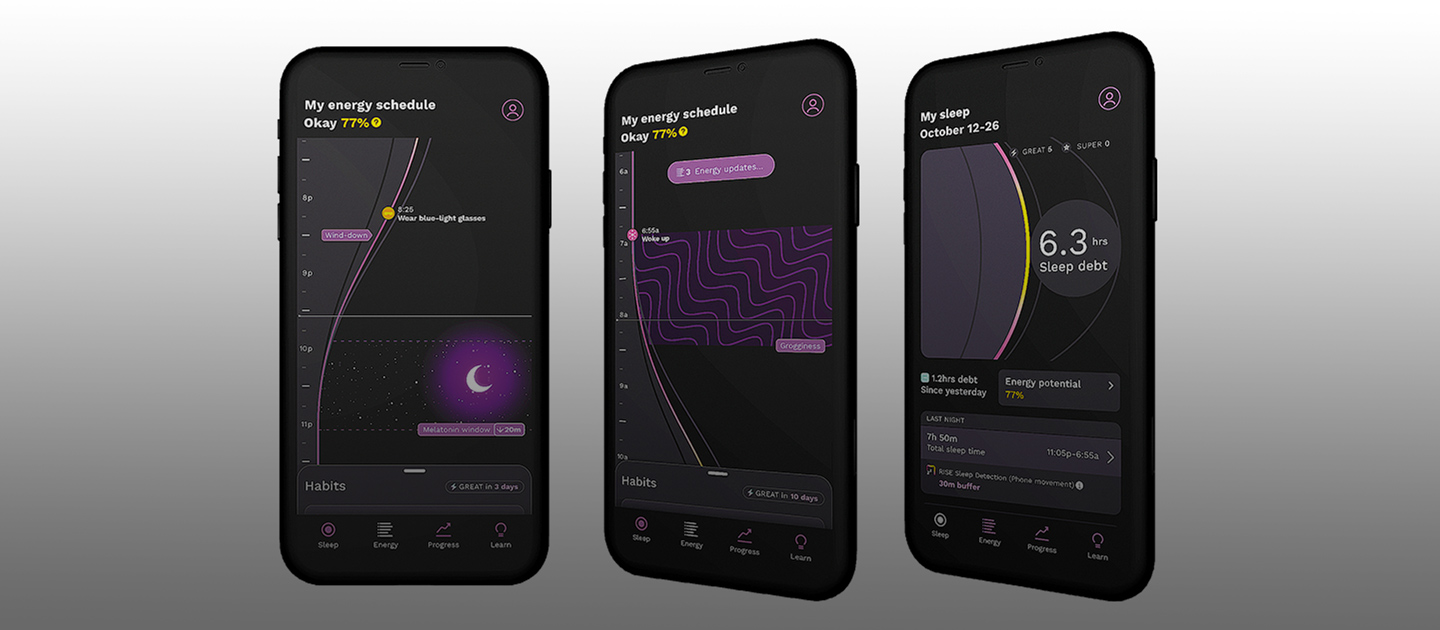Rise and Shine
Science-backed RISE app aims to help people become healthier, happier, and well rested by gaining control of their energy levels.


As an engineering student with a heavy workload and crammed schedule, Jeff Kahn (’13, MS-EDI ’15) woke up exhausted most days. His mood and productivity levels were low, and he started to wonder whether his sleep had something to do with it.
He was right. Sleep deprivation can wreak havoc on mental and physical health, and almost half of all Americans say they feel sleepy at least three days a week, according to a 2020 National Sleep Foundation poll.
Enter Rise Science, an energy optimization company cofounded in 2015 by Kahn and Leon Sasson (’15). The company’s RISE app, launched over this past summer, helps users improve their sleep and harness their daily energy levels.
Instead of just tracking sleep data, as other sleep apps in the market do, RISE goes a step further. Based on the two-process model of sleep regulation—which takes into account both circadian rhythms and sleep debt—the app shows users at what times their energy levels will be high and low throughout the day. It also suggests how to change daily behaviors to optimize energy levels and get the amount of sleep they need.

Focusing on Solving the Right Problem
RISE is grounded in sleep science, an area of study Kahn dove into during his sophomore year. Though he was an engineering student, Kahn discovered he could customize his curriculum by pursuing combined studies in health systems engineering. Driven to learn as much as possible about sleep, Kahn set up independent studies with sleep scientists at the Feinberg School of Medicine, while poring over sleep studies and enrolling in sleep seminars.

“It was freeing to be able to take classes that really mattered to me and that applied directly to my work,” Kahn says. “Once I focused on a problem I really wanted to solve, that was a huge turning point.”
Around that time, he met Sasson, a computer science and industrial engineering student, and the two started talking about the importance of sleep. Sasson says, “Jeff convinced me that sleep is so important. As engineering students, we had very late nights in the computer lab and then 8 a.m. classes. I realized I was basically operating as if I were drunk all the time from a cognitive perspective.”
After learning the sleep science behind why they felt tired, Kahn and Sasson set up an independent study with Dan Brown, clinical professor at the Segal Design Institute. Brown, who teaches human-centered design, helped Kahn and Sasson apply the scientific sleep principles they learned into designing a product for people.
During spring finals week of their sophomore year, Kahn and Sasson met with the Northwestern football team. Tory Lindley, former senior associate director of athletics, asked them to roll out a solution to help all the team’s players improve their performance on the field by improving their sleep—and do it in time for training camp in August.

Turns out there was. The beta version of the RISE app, launched in 2020, has been downloaded by more than 1 million users around the world. Now, Rise Science is celebrating its latest milestone: a $15.5 million funding round that includes $10 million in new Series A funding and a previous $5.5 million in seed round participation.
So much of what we do as a company today is applied research. Complex systems, statistics, and probability are fundamental to running the company, and I didn’t understand how that worked before McCormick. I gained a lot of confidence as a builder.
Jeff Kahn (’13, MS-EDI ’15)
Leaning on a Northwestern Network
Kahn plans to use the funding to continue improving the technology. “So much of what we do as a company today is applied research,” Kahn says. “Complex systems, statistics, and probability are fundamental to running the company, and I didn’t understand how that worked before McCormick. I gained a lot of confidence as a builder.”
Growing their network was also a key factor in the duo’s success. Sasson and Kahn met Northwestern alumnus Mert Iseri (’11), cofounder of healthcare startup SwipeSense, who mentored the pair, and they still have a small network of other Northwestern founders they call on for advice and connections. “Graduating from school, you have no connections, so this network was a great bridge to the tech industry at large in Chicago,” Sasson says.
“We wouldn’t be here without McCormick being open to our doing all of these things,” Kahn says. “From conducting combined studies to getting research funding to co-opting our project to having access to all these close connections with people who supported us and believed in us, we’ve been so incredibly lucky.
